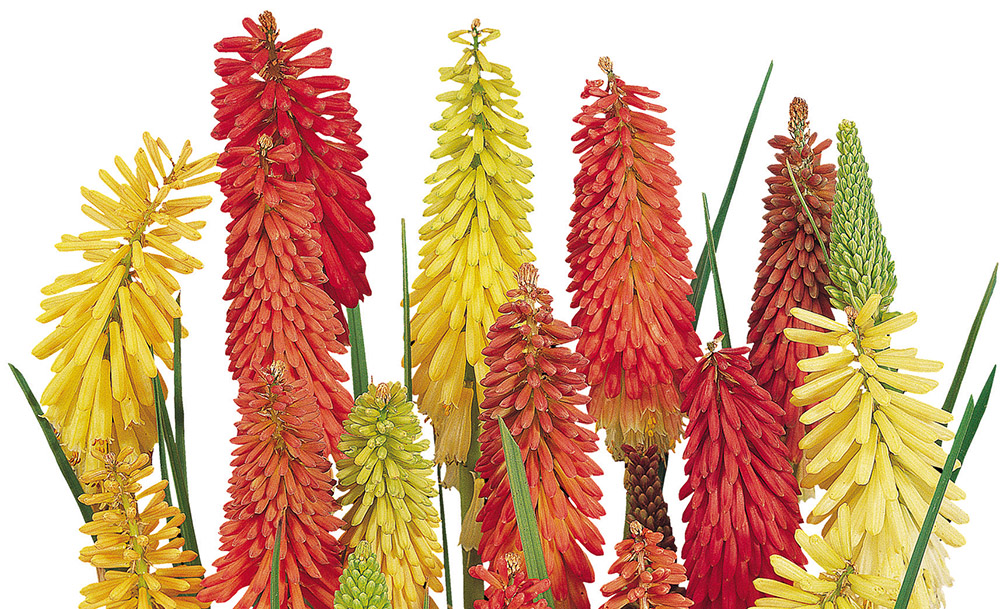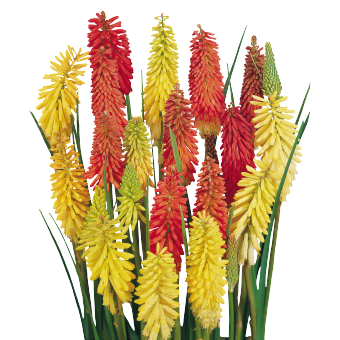

Flamenco
- FastraX perennial: First year flowering without vernalization
- Magnificent flower spikes
- Mixture of yellow, orange and red shades
- Perfect for flower arrangements
- Crop Time
- Spring: 26 - 28 weeks
- Height ∅
- 31 ″ / 80 cm
- Exposure
- Sun
- Seed Form
- BeGreen Priming
- Heat Zone
- 9-1
- Hardiness Zone
- 5-9
- Best Uses
- Bedding, Cutflower, Landscape
Culture guide
Usage
Evergreen perennial for border and bedding, cut flowers
Sow time
January-May for flowering in pots from July onwards, June-August for flowering in pots the following year
Sowing method
2-3 seeds per plug, can be sown directly in final pots (4-6 seeds)
Germination
Germinates in 14-20 days at 65-72 °F (18-22 °C). Light is required for germination. During Stage II, maintain temperatures of 65-68 °F (18-20 °C). During Stages II and IV, gradually reduce temperature to 58-62 °F (14-16 °C).
Growing on
Transplant plugs after 8 weeks. Grow on at of 60 °F (15 °C) in a well-drained, humus, loamy medium. Vernalization is not required for flowering
Media
Use a well-drained, growing perennial substrate with 0-15 % clay, 0-15 % parts (e.g. bark, wood fibres), 1,5-2 kg/m³ complete balanced fertilizer, 2-3 kg/m³ slow release fertilizer (3-9 months), iron-chelate, micronutrients, pH: 5.5-6.2. Field: humus sandy soils, with a good drainage and the soil should warm up quickly. Standard fertilization: 60-80 g/m² of a slow release fertilizer.
Temperature
Grow at 15 °C or outdoors. In winter indoors frost free at 3-5 °C or outdoors. Outdoors a fleece cover or mulch cover with straw (20 cm) is needed. In spring the plants start to grow at 12-15 °C and long day. A chilling period for flower initiation is not required, but with a chilling period the flowering is more uniform and full. Kniphofia can also be made to flower 2-4 weeks earlier in the poly-tunnel.
Fertilization
High fertilization levels are required. Fertilize the crop weekly with 100-150 ppm nitrogen (at 3 kg/m³ slow release fertilizer in substrate), using alternating a complete balanced fertilizer and calcium nitrate fertilizer. Avoid high ammonium levels. Don’t fertilize after mid September. In spring fertilize with 100-150 ppm nitrogen of a potassium balanced fertilizer (N: K₂O-ratio: 1:1,5). Prevent magnesium deficiency by applying magnesium sulphate (0,05 %) 1-2 times and in case of iron deficiency apply iron-chelate for 1-2 times. Field: If necessary according to analysis, improve the soil with 100-150 g/m² of a slow release fertilizer per year, applied in several portions.
Stage I Starts with the radicle breaking through the testa. The roots are touching the medium. Ends with fully developed cotyledons.
Stage II Starts from fully developed cotyledons. Ends with the fully developed true leaf or true leaf pair.
Stage III Starts from the fully developed true leaf or true leaf pair and ends with 80% of the young plants being marketable.
Stage IV All young plants are ready for sale and in the process of being hardened off. This stage lasts about 7 days.
The cultural recommendations are based on results from trials conducted under Central European conditions. Different conditions in other parts of the world may lead to deviations in results achieved.

